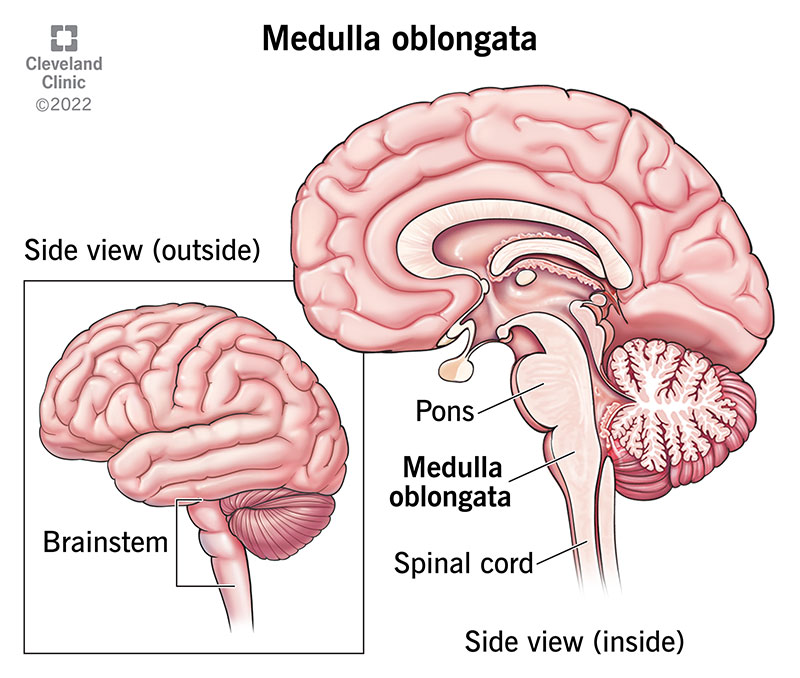Your medulla oblongata is the bottom-most part of your brain. Its location means it’s where your brain and spinal cord connect, making it a key conduit for nerve signals to and from your body. It also helps control vital processes like your heartbeat, breathing and blood pressure.
Advertisement
Cleveland Clinic is a non-profit academic medical center. Advertising on our site helps support our mission. We do not endorse non-Cleveland Clinic products or services. Policy

Image content: This image is available to view online.
View image online (https://my.clevelandclinic.org/-/scassets/images/org/health/articles/23001-medulla-oblongata)
Your medulla oblongata is a part of your brainstem, which connects your brain to your spinal cord. That makes your medulla a major connection point in your nervous system. It also manages many of the most important functions of your body.
Advertisement
Cleveland Clinic is a non-profit academic medical center. Advertising on our site helps support our mission. We do not endorse non-Cleveland Clinic products or services. Policy
Your medulla oblongata (med-oo-la ob-long-ah-ta), often just called the medulla, is a key part of your nervous system. It’s key not only because of its location but also because of what it controls. Some of its jobs include:
Advertisement
Your cranial nerves (which come in pairs and use Roman numerals to set them apart) that pass through your medulla include the following:
Your medulla is the bottom-most part of your brain, connecting to your spinal cord through the foramen magnum, an opening at the bottom of your skull. Just above your medulla is your pons, which is just below the central structures in your brain.
Your medulla also separates the nerves that control muscle movement, which are on the left side, and the nerves that control certain sensations like touch, temperature or pain, which are on the right side.
Your medulla is generally tube- or funnel-shaped. It’s widest at the top, where it connects to your pons.
Your medulla is beige or off-white with a slight pink tint.
Your medulla is an incredibly important structure, but it’s also very small. It’s only about 1.1 inches (3 centimeters) long, and its widest diameter is just over 0.78 inches (2 centimeters) across.
The average adult human brain is between 2.6 and 3.1 pounds, of which your medulla accounts for about 0.5%. That means your medulla weighs between 2 ounces and 2.5 ounces (59grams to 72 grams).
Like all other brain tissue, various types of white and gray brain matter and nerve cells make up your medulla. The tissue of your brain is roughly:
There are also a few conditions with specific names because of a stroke near your brainstem. These include:
Advertisement
The symptoms of conditions affecting your medulla are most likely to look like symptoms that affect parts of your body with nerves that run through your medulla. A key difference is that with a stroke affecting your medulla, you’ll often have certain symptoms on one side of your body and others on the other side.
Advertisement
Some of the most likely symptoms include:
Many tests can help diagnose conditions that affect your brain, including your medulla. Common tests include:
Some of the treatments for conditions in your medulla are specific, as this part of your brain is so specialized. Your medulla’s location also means that surgery can be difficult or even impossible because of the risk of damaging nearby parts of your brain or spinal cord.
You can do several things to help prevent damage to your medulla or avoid conditions that affect it.
Advertisement
No, your medulla doesn’t control aggressive behavior, anger or similar emotions. Those emotions rely on two other areas of your brain, particularly, your limbic system. Your medulla’s only role in aggression is how it manages your heart rate, breathing and other autonomic processes.
Your medulla oblongata is a tiny part of your brain that’s vital to life. It acts as a relay station and helps direct nerve signals to and from various parts of your body. Without it, you couldn’t do things as simple as saying your name or as complicated as throwing or catching a ball. Knowing about your medulla oblongata can help you better understand your own body, and it can also help you take better care of your brain and nervous system health.
Learn more about the Health Library and our editorial process.
Cleveland Clinic's health articles are based on evidence-backed information and review by medical professionals to ensure accuracy, reliability, and up-to-date clinical standards.
Cleveland Clinic's health articles are based on evidence-backed information and review by medical professionals to ensure accuracy, reliability, and up-to-date clinical standards.
If you have a neurological condition, you want expert advice. At Cleveland Clinic, we’ll work to create a treatment plan that’s right for you.
